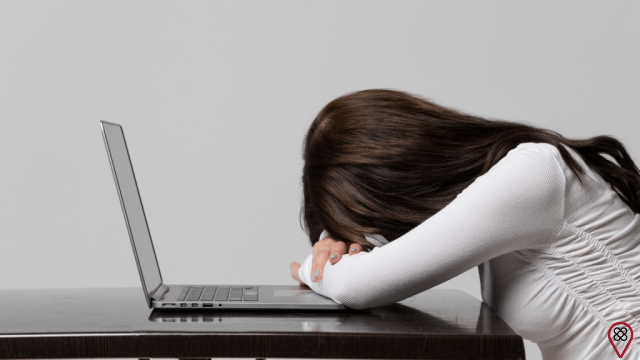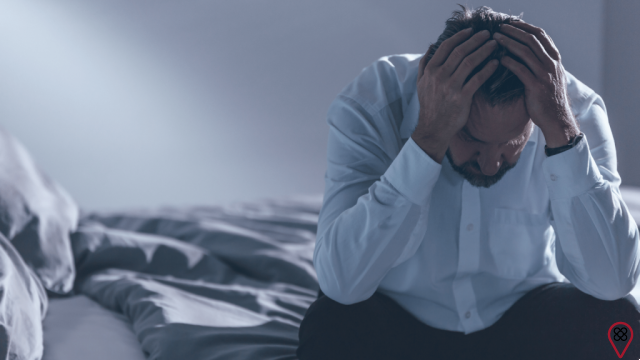In the past 7 days, on how many days have you woken up feeling like you were feeling exhausted, even though you just woke up? Mostly, right? That meme that says "I woke up tired" has never been so real. And so many people have felt this that this concept has even gained a definition: society of tiredness.
Have you heard about the tiredness society? Do you know what it's about? Well in this article we will explore this concept, what characterizes it and why it is doing so much harm to us as a society.
What is a tired society?
The originator of the term is the South Korean philosopher Byung-Chul Han. According to him, we are living in a society in which excessive demands have been naturalized, whether at work, in the family environment, in romantic relationships, on social networks, etc. This absurd charge is for productivity, for being “always better”.
In addition, despite this great demand and the exhaustion that this causes, we are always asked for positivity as well. Not putting your head down and smiling even when surrounded by chaos is one of the pillars of this tired society.
And all or almost all of us are going through it. In other words, it is such a general problem that it has already become a collective issue, hence the term “society” in the expression, since we are all feeling extremely pressured and tired by the high demand and the expectation of performance.
Productivity always
How many weeks have you concluded lately with the feeling that you've accomplished everything you set out to do—all without feeling overly tired? Few, right? The truth is that we currently have too many demands for too little time.
In addition to the demands that have been part of our lives for centuries — work, study, family, children, marriage, relationships, friends — many new responsibilities and opportunities have emerged: travel, movies, series, news, podcasts, content of all kinds, memes, social networks and so on.
We simply don't have the capacity to process as much information as we are currently receiving, and there the fatigue is twofold: it comes from not being able to handle everything, despite trying hard, and also from the frustration precisely for not being able to handle everything.

Comparisons and more comparisons
Another great pillar of the tired society is comparison, that little thing we do all the time in the age of social networks. You compare your job title and the company you work for on LinkedIn, your travels look dull next to your friends' amazing Instagram photos, everyone reads dozens of books and watches hundreds of movies, and you don't. No time, no energy left.
And this constant comparison always makes us come to a conclusion: we are late, we need to catch up, we need to do 2 hours of physical exercise every day, read 50 pages of a book, meditate, clean the house, take care of the children, intimacy with our partner and on top of that smile!
Just reading it is exhausting, isn't it? And the truth is that we are not thinking about what our time is, because we are living all the time at the rhythm of others, trying to keep up with unreal people (because we see in social networks a small part of who people are), so it is impossible to even give account of it.
Increasingly demanding jobs
Burnout syndrome has never been talked about as much as it is currently. Excessive demand, expectations and demands in the professional and career environment have made many people simply lose their mental health.
In search of more qualifications, better salaries, more interesting positions and more reputable companies, we are donating more and more of our time to professional life, without calculating the consequences of this effort. So let's give up who we are in personal life in search of being someone in professional life.

absolute isolation
According to Byung-Chul Han, the creator of the tiredness society theory, we live in times when we are connected all the time by digital means, but the truth is that we have never been so isolated and locked inside ourselves.
According to the philosopher, despite the feeling of sharing everything all the time, people have never had as many unresolved problems, trauma and dissatisfaction with their lives as they are having now, hence the boom in problems such as depression, generalized anxiety disorder. , among many other mental health ailments.
And the positivity up there!
"The early bird catches the worm". “I got here because I deserved it”. "Work while they sleep." “In the end, everything will work out.” This is called toxic positivity, a positivity that disregards real feelings and paints abusive situations with false colors.
We live in times, according to Byung-Chul Han, in which it is considered weakness to recognize your vulnerabilities and flaws, because everyone is always perfect: in photos, in social media texts, in professional achievements. So who wants to be the one who publicly admits his faults and acknowledges his mistakes?
The most negative consequence of this is that we fail to respect our right to be sad, to not feel good, to be going through difficult times. All this in the name of keeping productivity high and positivity up there. After all, a sad face is not successful in the age of the image, is it?

How to fight the tired society?
That's the million dollar question. There is no magic formula or cake recipe, because we are still discovering how this is happening and how we are dealing with this new moment of humanity. However, you can take some small steps to take care of yourself.
1 — Stop comparing: understand that everyone has their time and that the achievements of the other do not cancel out the importance of yours. Live your life at your own pace;
2 — Allow yourself to be sad: don't fake smiles, even if you need to step away from the whirlwind of social media. If you need it, seek help, don't be alone, but remember: being sad proves that you are human, it's part of life;
3 — Escape the screens: whenever you can, put your cell phone, computer, TV and all other screens aside, as well as the anxiety of knowing what is happening now, what people are doing;
4 — Fewer stimuli: following the previous advice will help you to decrease the amount of stimulation you receive and, consequently, you will feel less rushed and less exhausted;
5 — Seek help: doing psychotherapy will help you understand where your feeling of exhaustion comes from. So it will also help you understand what can be done to combat this and feel better about yourself.
You may also like
- Exhaustion Crisis! What is it?
- The importance of rest for the heart
- Discover the book “Paths to the culture of good living”!
- See 5 Stupid Things Society Charges You
- What does it mean to be supportive in today's society? Reflects
Finally, the tiredness society is a reality and you need to understand, above all, that you shouldn't feel tired because you feel this exhaustion. Many are, almost all are, so try to step away from the whirlwind of information we are receiving and allow yourself to simply rest and relax.

























